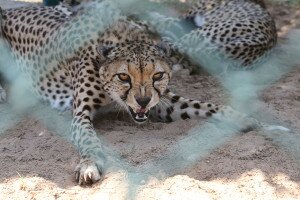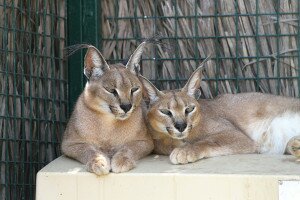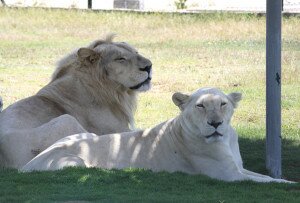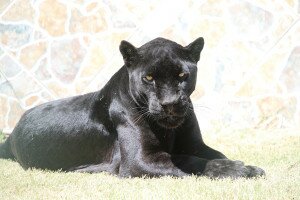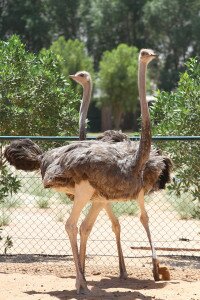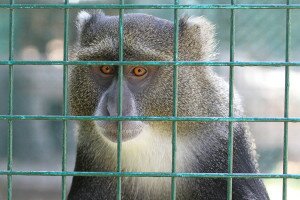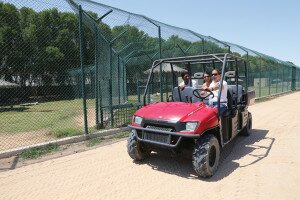Abu Dhabi Week discovers where the wild things are
The cheetah’s ears are tucked low on her head, her large yellow eyes glaring at the unwelcomed guests. Her spotted coat glimmers in the sunlight as her legs spread out in front, her body arched and ready to pounce.
The camera lens zooms in for a close-up and then comes the hiss – part snarl and part warning – her teeth bared and nose wrinkled in anger, she is clearly telling us to leave her alone.
And we do.
We quickly shuffle off, camera in hand, slightly on edge from our up close and personal encounter with an aggressive cheetah. With a skinny chain-linked fence separating us from the angry cat, only one thing comes to mind – that was wild.
Menagerie in Mussaffah
Unfortunately here in the United Arab Emirates, many people fail to recognise that these exotic animals are wild and should remain in the wild. Residents taking up endangered species as house pets has become a dangerous and regrettably all-too-common occurrence here in the capital.
“People should not keep wildlife as pets, they don’t belong in villas or in gardens, they belong in the wild. They are dangerous and taking animals out of their environment doesn’t give them the chance to breed with their own species, to interact with their own species and live a natural, happy, healthy life.
“When you take an animal out of the wild you are basically condemning it to an unnatural life,” says Ronel Barcellos, director of Abu Dhabi Wildlife Centre.
The Abu Dhabi Wildlife Centre, which was founded in 2001, is a rescue and rehabilitation centre for big cats, most of which were rescued from the illegal exotic pet trade. Hidden in a maze of industries and sand dunes on the outskirts of Mussaffah, the large and expansive farm is a welcome sight. Fenced inside with scores of tree-lined avenues and grassy enclosures, the centre is impressive in sheer size and in the facilities on offer to the animals.
Animals housed at the facility include Bengal tigers, cheetahs, jaguars, Siberian tigers, African lions, caracals, Serval and Leopard cats. In addition to big and small felines, the centre is also home to Arabian wolves and Siberian wolves, Red deer, hyenas, monkeys, baboons, tortoises, donkeys, parrots and much more.
Paws for thought
“All of the animals that come here have a story, each and every one of them,” explains Barcellos, the South African wildlife expert who has been in the UAE since 1998.
There’s Maya, a beautiful Bengal tiger, who was confiscated at the Abu Dhabi Airport. The two-week-old cub was starved and near death when she first arrived, with numerous burns and large chunks of striped fur singed off her tiny neck; we can’t help but get squeamish as we look at the pictures of her arrival. With plenty of patience and hand rearing the sickly cub now weighs in at an impressive size, full grown and ferocious.
The dire living conditions and neglect some of the animals have experienced is truly shocking. We are told of a hyena squashed into a birdcage. A lion chained up in a Khalidiya garage, with no access to water or food. We glimpse a slim cheetah limping in the grass, with an injured leg that’ll never be healed fully.
Lions have arrived with their teeth cut off, nerves exposed. Living in severe pain, Barcellos likens the ghastly procedure to a root canal that never heals – and one that stops the animal from eating at all. Others have come with their nails declawed, which “is like cutting off the first digit of your finger”. All of these procedures done in the name of protecting the previous owners from the animals they deem to keep as household pets.
The animal advocate explains that unfortunately, rehabilitated animals will never be able to return to the wild again. Once they are confiscated and taken away from their mothers the animals lose the ability to learn the natural instincts they need to survive in the wild. Relocated to these types of halfway homes, the animals are deprived of a natural life but are given the best life possible for their circumstances.
“I hope people realise how totally helpless animals are, how dependant they are on us, trusting us, that we will be kind and take care of their needs. Animals are our responsibility, a responsibility we have no right to neglect, or to violate by cruelty and ignorance.”
Mission and milestones
Originally located in Al Wathba, the centre moved to its current and much larger location in 2005. Featuring over 36 open-air enclosures for the animals, the big cats housed at the facility, live in comfortable grassy homes, featuring trees, splash pools, rocks and of course, an air-conditioned unit when the heat is too strong. In addition, there is an on-site veterinary clinic to deal with any health conditions or issues the animals may have, a small gift shop and education centre.
Initially developed to house and rehabilitate the illegal animals in the country, as the centre evolved, the organisation began work with other captive centres in regards to breeding loans and programmes. Currently their Arabian leopard, Sultan, is on loan to the Sharjah Breeding Centre, with the hope that he will help increase the population and overall health of his species.
There have been a handful of animals born onsite, and a number of success stories when it comes to breeding. In fact, when we visit, we are shown a hyena that has just given birth to a baby a few days ago.
The centre is keen on educating and empowering the next generation of animal lovers. By providing guided tours to the public and also working with 120 local schools, the facility hopes to curb the spread of keeping illegal animals, raise awareness about their plight, and inform students about how they can get involved in protecting the environment.
“What are we going to leave behind for the children? That’s my main concern. By educating the kids who come to the centre, to learn what they need to do, we are creating future conservationists,” adds Barcellos.
No more monkey business
Laws have already been put in place to protect exotic animals here in the UAE, however the main issue comes from trying to locate the illegal animals and confiscate them. Owners of illegal animals face hefty fines and even jail time, yet even these harsh deterrents haven’t stemmed the prevalence of keeping these creatures as pets.
Most of the animals in the Abu Dhabi Wildlife Centre have been confiscated, with help from the police and other local environment agencies, or even donated directly by owners who realise they’re in over their heads.
Barcellos urges the public to stay alert and report suspected abuses. By visiting the organisation’s Facebook page or ringing the office, enforcement of the laws protecting exotic animals will help curb any extra abuse from occurring.
Want more?
The centre is open to the public and schools. Guided tours are given on appointment. Donations and volunteers are welcome. For more information visit the Abu Dhabi Wildlife Centre Facebook page or call 050 721 8169 from 9am to 5pm to schedule a visit.
Sawaiba Khan













